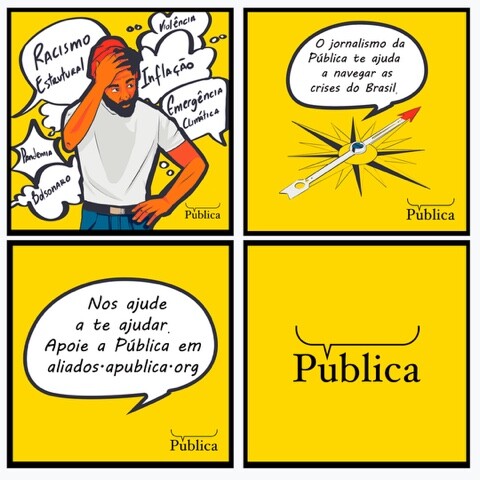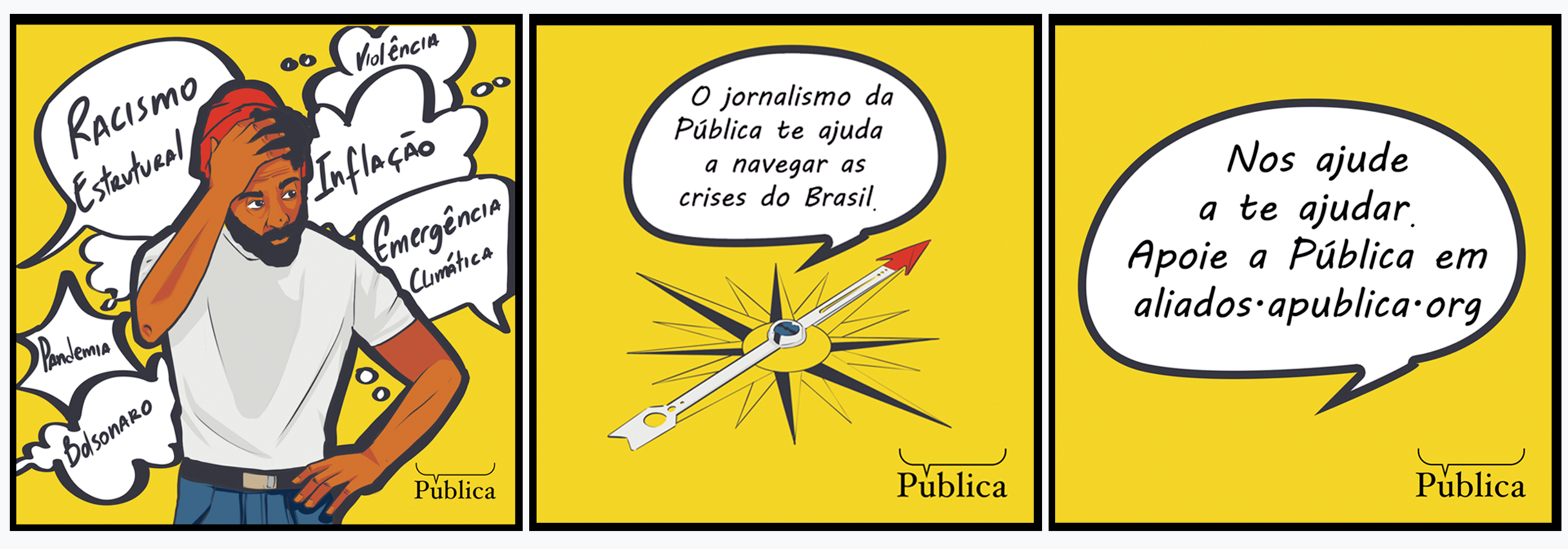This article was researched and written by José Cícero da Silva for Agência Pública, LAB’s São Paulo partner.
Translated for LAB by Tom Gatehouse. You can read the original (in Portuguese) here.
The first case of coronavirus in one of Brazil’s favelas was confirmed by Rio de Janeiro’s health ministry on 21 March, when a resident from the Cidade de Deus, one of the biggest communities in the west of the city, tested positive for the disease.
For the 14 million Brazilians all over the country who live in favelas and urban peripheries, the Ministry of Health guidelines are not easy to follow. Hence the importance of local communications activists.
The Minister of Health, Luiz Henrique Mandetta, has praised some of the measures that these communities have adopted. “It’s very important that every leader in the country protects their community,” he said in a press conference on 30 March.
In the absence of measures directed at the favelas by the federal government, Agência Pública spoke to popular communicators in five state capitals – São Paulo, Belém, Recife, Salvador and Rio de Janeiro – to find out how they are organizing in the face of the coronavirus pandemic.
São Paulo: podcasting in the language of the favela

Ronaldo Mattos is a communicator and member of Desenrola e Não Me Enrola, a project bringing together communicators from peripheral communities in São Paulo – the epicentre of COVID-19 in Brazil.
With the aim of combating fake news, providing tips on prevention, and keeping people up to date on the latest government advice, Mattos linked up with the journalist Gisele Brito, the communicator Tony Marlon and the websites Periferia em Movimento and Alma Preta. Together, they began work on the podcast Pandemia Sem Neurose.
“We envisaged a short podcast, just two or three minutes long, quick to access and load on a mobile phone, that won’t take up a lot of space and can be reproduced on a bigger scale. It’s been a great success. We’ve had feedback from elderly people and from people who live in totally different parts of the city. From the south to the far north,” he says.
For Mattos, speaking for the periphery and not about the periphery is a “fundamental issue”. “If this information doesn’t reach the people who need it, then what’s the public value of this content? It has to spark a discussion amongst older people, amongst young people haven’t understood the gravity of the situation and are still going out to parties. That’s what we’re focusing on.”
In Heliópolis and Paraisópolis – the two biggest favelas in the state of São Paulo – residents have also been organising. In Heliópolis, the Union of Residents’ Groups and Associations (UNAS) has been holding collections for food and hygiene items.
They also conducted an online survey on the impacts of coronavirus on the favela between 27 and 29 March. The 653 responses clearly illustrated the economic implications: 68 per cent of families living in Heliópolis have already lost some of their monthly income since restrictions on movement were put in place. Of these, 19 per cent have lost their entire income.
In Paraisópolis, the Residents’ Union has set up committees with leaders in different areas. “420 leaders were identified,” says its president, Gilson Rodrigues. “They’re volunteers who will monitor on average 50 houses each. The aim is to cover 21,000 households, reaching the 100,000 people who live in the favela.”
Belem: fighting fake news in the periphery
Juraci looks straight at the camera. “We decided to block the road to demand our right to water. Because we’re not getting any. When we do, it runs very yellow,” says the resident of Terra Firme, a neighbourhood of 60,000 in the periphery of Belém, Pará. Behind the camera is Izabela Chaves, a 25-year-old student and popular communicator, also a local resident.
What sparked off the protest was the news about coronavirus. “They’re worried about going to work, taking a shower, doing the basics,” says Izabela. A film and audiovisual communication student at the Universidade Federal do Pará (UFPA), she is part of the group Tela Firme, which works in audiovisual production and training for young people in the Belém periphery.
At the time of writing, Pará has 32 confirmed cases of COVID-19 with 33 more suspected. Tela Firme joined the coalition LabPerifaCom, or the Laboratory of Young Communicators in the Belém Periphery, hastily formed on 22 March to monitor official communication and amplify the concerns of the peripheries in the context of the pandemic. They combat fake news and produce information designed for local realities.
The teacher Lilia Melo coordinates the project Cine Clube TF, which is also part of the coalition. She emphasizes the importance of the local communicators at this time.
“We’re taking advantage of our network to offer guidance on prevention and combat of the virus, for young people and in a language they understand. We realised that there are some young people in the neighbourhood who still haven’t realised how serious this is. Because of their reality, the difficulties they face, they tend to mock the recommendations from the state and federal governments, which don’t speak to the reality of the periphery,” she says.
Recife: translating the official guidance

Concerned by the city government’s failure to provide informative material on the prevention of coronavirus, she went looking for posters herself. But dissatisfied with the dry official communication, Yane made her own posters and put them up next to the official ones – a translation of sorts. “The aim is to send a direct, concise and simple message,” she says.
This issue of language also arose for the filmmaker Yane Mendes. While by her own admission she is “no designer”, she decided to adapt the official Ministry of Health information for the 2,500 residents of the Totó favela, in Recife, Pernambuco.
She says this has been effective, with several locals who were strangers to her approaching her to ask what her next intervention would be. People from other communities have also been in touch to ask for the material, emphasizing the importance of language which reflects local realities. This led Yane to create a WhatsApp group for anyone interested in creating forms of communication for their community.
“I realised that for now I have to begin with what’s around me, which is the community I was born into. I started out alone, but then with two friends I created Rede Tumulto, which is a collective, although it was my idea. This was very much inspired by the group #CoronaNasPeriferias. Seeing that other people are active in their favelas is a big motivation,” she says.
Salvador: keeping people calm in the periphery

Fake news about coronavirus is a worry for Jefferson Borges, a publicist, social activist and founder of the website NORDESTeuSOU. Borges lives in the Salvador periphery, in the neighbourhood of Amaralina.
“The local ministry of health is releasing figures for the neighbourhoods now and ours is the only one in the periphery which doesn’t have any cases yet. Cajazeiras, Itapuã and Engomadeira are three other neighbourhoods in the periphery and there’s a case in each,” he says.
Jefferson says that fake news creates fear amongst residents, who don’t know what to believe. “There are lots of threads on WhatsApp and social media, and sometimes news will come out that someone has died. So we have to go and check it out, to make sure the community doesn’t panic.”
To mitigate the impact of misinformation, the collective has been trying to inform the community about what is really happening, while distributing material aimed at promoting preventive measures, such as avoiding social gatherings. This material is disseminated via mobile phones, as well as in pamphlets handed out in the street. There is also a car with a loudspeaker that circulates for five hours a day.
Rio de Janeiro: “What was in Europe was here now too”

“After the first confirmed case, people began to realise that this was something serious, that what was in Europe was here now too,” says Ricardo Fernandes, an actor and resident of the Cidade de Deus. “The change in people’s behaviour was very clear.”
Ricardo is part of the Frente CDD, a recent initiative which brings together residents, activists, health professionals, groups and individuals, which came about with the aim of mitigating the impact of coronavirus on the community.
“There were already two groups in the Cidade de Deus doing food collections. We created the Frente to make it broader, go beyond the donations and work on awareness raising in the community,” he says.
“We’re at a disadvantage for being a favela in Rio de Janeiro. There’s violence, a lack of basic sanitation, a lack of education, water shortages. We live with all these problems every day. But with coronavirus, all these issues could become much worse,” he says.

In another community, the Complexo do Alemão, communicators are also organising awareness-raising campaigns. They have created banners and posters, distributed leaflets and spoken face-to-face with people in the streets, emphasizing the need to prevent the spread of the virus.
On 26 March, Brazil’s leading bioscience and research institution, the Fundação Oswaldo Cruz held a press conference via YouTube aimed specifically at popular communicators in Rio’s favelas. More than 100 people participated, including people from cities elsewhere in Brazil.











